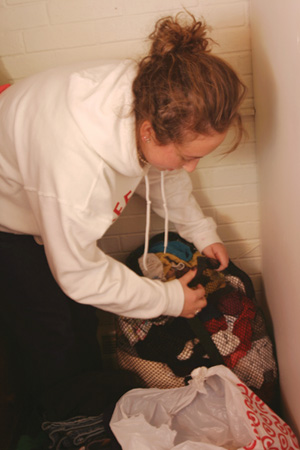Junior Laura Henry’s bedroom in her four-person Garden apartment is immaculate. From her shelves, stocked with 183 alphabetized DVDs, to her bedspread, lint- and wrinkle-free, she is adamant about keeping her room neat and tidy.

“I take pride in the space I live in,” Henry said. “It’s part of my image.”
But not everyone in the apartment shares Henry’s philosophy. Just across the hall, junior Sara Pleskow said she feels her involvement with ICTV and the First Year Cabaret justifies her disorganized room.
“If you’re really busy, you don’t always have time to clean your room,” Pleskow said.
As a new semester begins and students return to nearly empty rooms, they are faced with the challenge of deciding how to maintain their living space. For students like Henry who value organization as an important life skill, the thought of a cluttered room is a major source of stress.
Linda Story, a personal organizer and co-owner of Clear The Way in Ithaca, helps her clients get their spaces in order. She and business partner Robin
Dubovi are members of the National Association of Professional Organizers.
“[Personal organizers] zero in on helping students [develop] learning skills, put patterns into place and see what organizational mentoring could do for them,” Story said.
She said a person can be classified as disorganized if he spends more than 30 minutes per day searching for missing articles. This lost time creates a stressful situation, one that an organizational system could easily dispel.
“When I get really stressed, I feel like I have to clean,” Henry said. “Some people drink. I clean.”
According to Story, the first step on the road to organization is to purchase a planner or calendar to keep track of daily tasks. Once a commitment is written down, she said she believes a person is more likely to follow through with it.
“[A calendar] is a key element,” she said. “It contains your intentions.”
Unfortunately, this does not work for every student. Pleskow said she purchased a planner at the beginning of the academic year, but despite her best effort, she said she could not motivate herself to use it effectively.
“At first I was like, ‘This will be a good idea,’” Pleskow said. “It was like a mini Palm Pilot. Except it was made of paper. After a while, though, I just started forgetting to write in it.”
Students who lack organizational skills often get discouraged, feeling it is too late in life to start cleaning up their act.
“It all depends on your personality,” Pleskow said. “You’re in college and, at this point, you’ve pretty much figured out who you are. If you’re not an organized person, you kind of just have to accept it.”
Story agrees that learning such important skills now can be challenging but said she believes it is the responsibility of formal educators to get this message across. She said not enough students are taught how to be organized early in life, and it only gets harder as they get older. This is something she notices when she works with clients.
“Very few of us were taught how to organize,” she said. “It’s not particularly well-represented in our educational structure.”
“Parents want to feel they are sending off their children with everything they need,” Dubovi said. “But then it comes time to organize their dorm.”
Story suggests that even if a student isn’t the tidiest person, he can create an organized space simply by keeping the things he most often uses available to him.
“One of the things easiest to do is to find out what you absolutely must have,” she said. “Items [should be] organized in a way that give you access. So the lava lamp might not need to be in the middle of the desk, but the assignment notebook should be.”
Ultimately, it is more important for students to feel comfortable in their living or work environment than for it to be organized. Some students are more comfortable when they know that everything is where it should be.
“When my room is clean, I feel like I have more control over other aspects in my life,” Henry said.
The people at the other end of the spectrum feel constricted by a rigid system and get stressed out at the mere thought of having to maintain organizational behavior. However, both sides agree that it is up to the individual to decide which way is best for him.
“There’s not one way to do things that fits everyone,” Dubovi said. “[People need to] think about their goals and take really simple steps so they can take control of their environment.”




